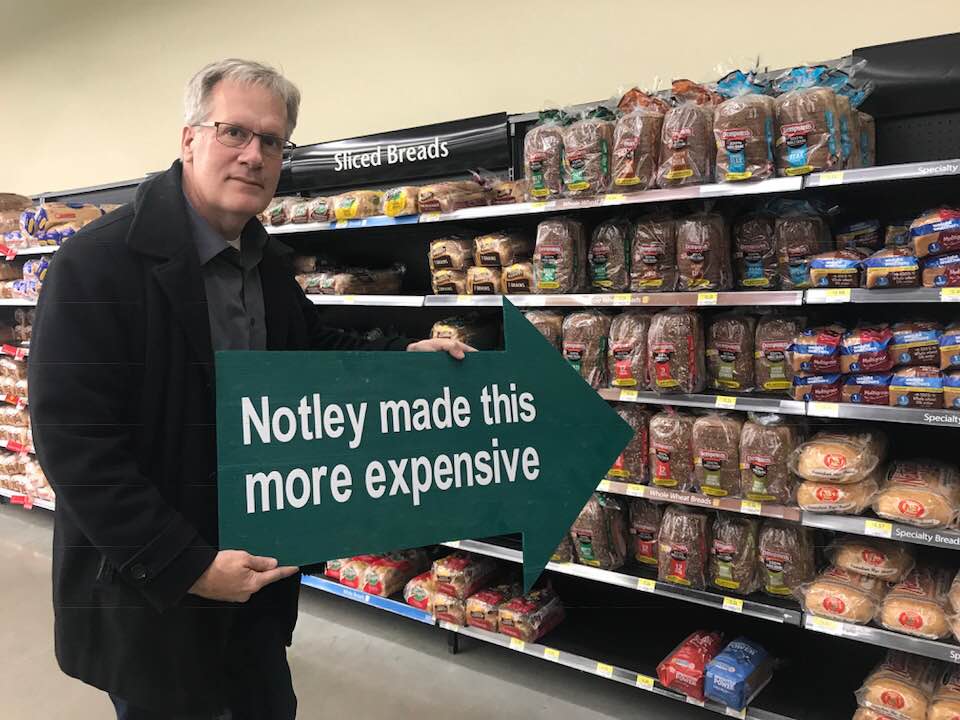Anatole France, the French poet, journalist and novelist, had his tongue firmly planted in his cheek in 1894 when he wrote: “The law, in its majestic equality, forbids rich and poor alike to sleep under bridges, to beg in the streets, and to steal their bread.”
The joke and tragedy of Anatole’s musing on the criminal justice system is obvious. The reality is that we are not all equal before the law — not even in Canada — not even in 2018. Poor people are criminalized for being poor. Addicted people are criminalized because of their addiction. And yes, there are many echoes of racism in our criminal law.
But I will let you in on a secret — it is even worse than that. Not only do we arrest, prosecute and jail the poor for minor offences but we also turn a blind eye to large-scale crimes committed by the rich and powerful.
Last month, days before Christmas, George Weston Ltd. and Loblaw Companies Ltd. admitted to participating in a 15-year price-fixing conspiracy to artificially inflate the price of bread. Loblaws claims it “discovered” Canadians were overcharged for the cost of bread, but make no mistake, this was an admission of illegal behaviour.
The actions of Weston and Loblaw not only clearly violated multiple sections of the Competition Act but also potentially amounted to criminal conduct. Let’s break it down. These two companies acted in concert with other industry players to secretly and artificially inflate the price of bread. This was a conspiracy to line personal and corporate pockets by defrauding the public.
But the Weston and Loblaw corporations, along with those pulling their corporate strings, acted quickly when the house of cards was at risk of collapsing. They moved into damage control mode, handed out $25 gift cards, and spun their way to immunity. Yes, people who secretly conspired to steal from the public won’t face criminal charges or other sanctions.
The law is indeed majestic. But only if you are rich.
Last year, I represented a homeless man who stole a cheap steak from an Ottawa Loblaws store. Unlike the powerful men and women who sit in the Loblaws boardrooms, my client did not steal for his own enrichment — he did it because he was hungry.
When my client was caught stealing, Loblaws called its publicly subsidized security force — the local police — and my homeless client was arrested and prosecuted for theft. A few months later when facing the judge in court, my client explained that at the time of the theft, he had nowhere to live and was hungry. He told the court he was sorry and that things had gotten better for him. He had found a place to live and was beginning to get back on his feet.
The Crown — as the representative of Her Majesty the Queen — stood up and asked the court to send my client to jail. A jail sentence would have resulted in my client losing his housing, possessions and much of the progress he had made since his arrest.
It was a Dickens novel come to life. And it perfectly illustrates the injustice of the present situation.
You see, my client was not able to afford a crisis management team to draft a pre-Christmas press release. My client was not in a position to buy off the public with gift cards. In short, my client was too poor to purchase immunity.
So, which is worse: a poor hungry soul who steals a steak or a large corporation which hatches an illegal scheme to steal millions of dollars from the public?
To make it even worse, Loblaws did not inflate the price of caviar and lobster; it piggybacked its greed on bread — a necessity. In other words, Loblaws’ crime disproportionately impacted the poor.
Loblaws is the dystopic Robin Hood.
The impact of Loblaws’ crimes may have even bigger impacts than simple reverse Robin Hood-ism because food prices are often considered by the government in determining the cost of living, low income cut-offs, and other economic policies. Oh and of course, right-wing politicians couldn’t resist the urge to use expensive bread as a political weapon, as Alberta’s United Conservative Party MLA Wes Taylor did in attacking Rachel Notley’s NDP government — we are still waiting for Taylor to issue his mea culpa.
The lawlessness of Loblaws and their co-conspirators should serve as a wakeup call to the inequities in our laws. Every day in our halls of justice we prosecute homelessness and poverty. And no one is better off for it — court time that could have been used to prosecute serious offences is squandered, and resources we could use to help marginalized members of our community are wasted.
And salt is rubbed in that wound every time privilege is used as a card to get out of jail free.
But I suppose if the poor can’t afford bread, they can always eat cake. ![]()















Tyee Commenting Guidelines
Comments that violate guidelines risk being deleted, and violations may result in a temporary or permanent user ban. Maintain the spirit of good conversation to stay in the discussion.
*Please note The Tyee is not a forum for spreading misinformation about COVID-19, denying its existence or minimizing its risk to public health.
Do:
Do not: